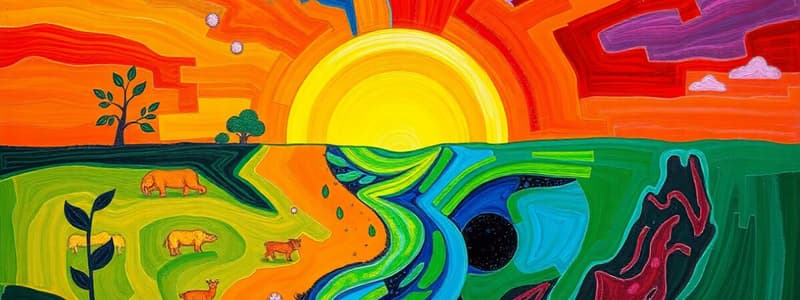Podcast
Questions and Answers
Which process in the carbon cycle is primarily responsible for taking in CO2 from the atmosphere?
Which process in the carbon cycle is primarily responsible for taking in CO2 from the atmosphere?
- Extraction
- Photosynthesis (correct)
- Respiration
- Combustion
Ocean acidification occurs when too much CO2 diffuses into the ocean.
Ocean acidification occurs when too much CO2 diffuses into the ocean.
True (A)
What happens to carbon during combustion?
What happens to carbon during combustion?
Carbon is released back into the atmosphere as CO2.
The process of _____ allows consumers to return carbon to the atmosphere while breathing or decomposing.
The process of _____ allows consumers to return carbon to the atmosphere while breathing or decomposing.
Match the following carbon cycle processes with their descriptions:
Match the following carbon cycle processes with their descriptions:
What is the main result of combustion within the carbon cycle?
What is the main result of combustion within the carbon cycle?
Carbon can only be found in the atmosphere and not in water.
Carbon can only be found in the atmosphere and not in water.
What do producers convert CO₂ into during the carbon cycle?
What do producers convert CO₂ into during the carbon cycle?
Humans extract _____ from the Earth's surface which can be combusted.
Humans extract _____ from the Earth's surface which can be combusted.
Match the following carbon cycle steps with their descriptions:
Match the following carbon cycle steps with their descriptions:
Flashcards are hidden until you start studying
Study Notes
Carbon Cycle
- Carbon is stored in Earth's reservoirs, including rocks, oceans, atmosphere, plants, soils, and fuels.
- Carbon continuously flows between these reservoirs.
- The carbon cycle has fast and slow components.
- Fast processes involve living organisms.
- Slow processes involve rocks, soil, and fossil fuels.
- Changes in the carbon cycle impact the Earth's temperature.
Steps of the Carbon Cycle: Fast Process
- Photosynthesis: Plants absorb carbon dioxide (CO2) and convert it into sugars and tissues.
- Respiration: Animals and decomposers inhale CO2 for respiration and release it back into the atmosphere.
- Burial and Sedimentation: Some carbon is buried and forms rocks or fossil fuels over millions of years.
- Extraction: Humans extract fossil fuels from the Earth.
- Combustion: Humans burn fossil fuels, releasing CO2 back into the atmosphere.
- Exchange with the Ocean: Carbon is constantly exchanged between the ocean and the atmosphere.
Other Important Notes
- A significant amount of carbon is exchanged between the ocean and the atmosphere.
- CO2 diffuses into the ocean, forming carbonic acid, which can lead to ocean acidification if CO2 concentrations are too high.
- Algae perform photosynthesis, converting carbon into sugars.
- Some carbon is stored as sediment on the ocean floor.
Carbon Cycle: More Information
- Combustion converts fuels and plant materials into carbon dioxide.
- CO2 constantly exchanges between the atmosphere and water.
Carbon Cycle Steps: Breakdown
- Producers: Organisms like plants convert CO2 into sugars through photosynthesis.
- Sugar Conversion: Sugars are converted back into CO2 through respiration or decomposition.
- Carbon Burial: Some carbon gets buried and forms sedimentary rocks.
- Fossil Fuels: Humans extract fossil fuels from the Earth.
Studying That Suits You
Use AI to generate personalized quizzes and flashcards to suit your learning preferences.




